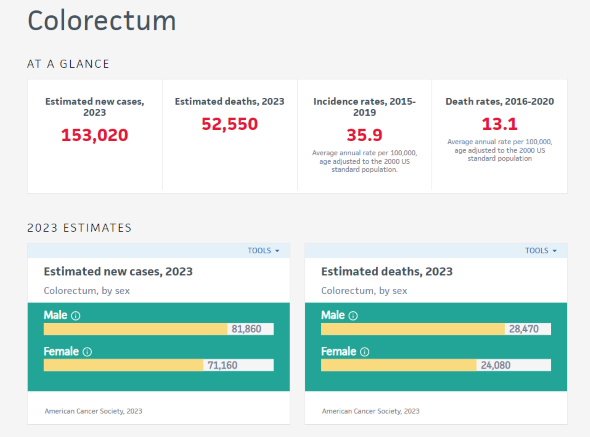Colorectal Cancer Research Highlights
The American Cancer Society (ACS) helps find answers to critical questions about colorectal cancer (CRC).
- What causes it?
- How can it be successfully prevented, detected, and treated?
- What is the best age to start screening?
- How can the quality of life for colorectal cancer survivors be improved?
Studying questions like these has helped improve screening and treatment methods, which has contributed to substantial decreases in deaths from colorectal cancer over the past 20 years.
Spotlight on ACS CRC Research Studies
Our staff of full-time researchers and funded scientists across the United States relentlessly search for answers to help us better understand cancer, including colorectal cancer. Here are some highlights of their work.
Colorectal Cancer & Diet Research

- Keto Molecule May Help Prevent and Treat Colorectal Cancer
- Improving Availability of Healthy Food Reduces Cancer Inequities
- Study Shows Caffeinated and Decaffeinated Coffee Have Different Risks for Colorectal Cancer
- Exploring How Food Choices Influence the Risk for Colorectal Cancer
- A CPS-II Nutrition Study: The Influence of Better Diet After Diagnosis for Colorectal Cancer
We Fund Cancer Researchers Across the US
The American Cancer Society funds scientists who conduct research about cancer at medical schools, universities, research institutes, and hospitals throughout the United States. We use a rigorous and independent peer review process to select the most innovative research projects proposals to fund.
The grant statistics to the left are as of January 4, 2023.
ACS Cancer Prevention Studies
The ACS Population Science department includes scientists who work with our large, on-going cancer prevention studies (CPS), such as CPS-II and CPS-3. Some of these studies include analyses about colorectal cancer. Here's a sample of their work.
Focus on Early-Onset Colorectal Cancer
One aim of ACS Population Science (PopSci) researchers leading Cancer Prevention Study-3 (CPS-3) and Cancer Prevention Study-II (CPS-II) is to learn more about the risks of developing colorectal cancer (CRC) and how to prevent it.
They're particularly interested in better understanding factors that may be contributing to the increasing incidence of early-onset CRC, which is diagnosed before a person is age 50. In fact, ACS PopSci researchers recently created a large consortium study focused on exploring risk factors for early onset CRC. This work has been highlighted in several medical journals.
- Unraveling the Etiology of Early-Onset Colorectal Cancer
- Cause of Early-Onset Colorectal Cancer Multifactorial
In addition, the CPS-II and CPS-3 biospecimen management team continues to build a tumor repository, including a collection of CRC tumor samples. Access to these samples supports large collaborations who are studying the link between lifestyle and behavioral factors with specific molecular changes in such tumors.
The CPS-3 Gut Microbiome Sub-Study will also allow PopSci researchers to investigate how the gut microbiome may be related to lifestyle and environmental risk factors of CRC and early-onset CRC.

Podcast: Investigating the Rise of Early-Onset Colorectal Cancer
Listen to this podcast about the trouble increase in early-onset colorectal cancer (CRC) with the former ACS Scientific Director in the Population Science department, Peter Campbell, PhD. As one of the leading researchers in this space, Campbell's work along with the work of other ACS researchers, helped lead to the ACS recommendation to begin CRC screening at age 45 for people at average risk.
Colorectal Cancer Statistics in Brief
Each year's ACS Cancer Facts & Figures includes data about colon and rectal cancers, and every 3 years, there's more in-depth data in Colorectal Cancer Facts & Figures. Here's an overview of some of their findings.

New Colorectal Cancer Facts & Figures Released
Data Shows Rapid Shifts to More Advanced Disease and Younger People
"We need to invest more in research to uncover the causes of the rising trends and to discover new treatment for advanced-stage diseases to reduce the morbidity and mortality associated with this disease in this young population, who are raising families and supporting other family members." - Ahmedin Jemal, DVM, PHD
More People Are Being Diagnosed with Colorectal Cancer Before Age 55 and at a Later Stage
Each year, the American Cancer Society department of Surveillance and Health Equity Science analyzes data on colon and rectal cancers (also known as colorectal cancers) as part of the ACS Cancer Facts & Figures work. Every 3 years, with support from their research teams, ACS epidemiologists Rebecca Siegel, MPH, and Ahmedin Jemal, DVM, PhD, publish Colorectal Cancer Facts & Figures and an accompanying article, “Colorectal Cancer Statistics.”
These publications provide statistics about colorectal cancers (CRCs) and about the use of colorectal cancer screening in the United States.
Here are some key findings.
Prevention for CRC
- About half of colorectal cancers in the US are attributable to these potentially modifiable risk factors:
- Carrying excess body weight
- Being physically inactive
- Smoking for many years
- Eating too much red or processed meat
- Not eating enough foods with calcium, such as milk, fortified plant-based milk such as soy or almond milk, fortified orange juice, and tofu that contains calcium salt
- Drinking too much alcohol
- Eating very few fruits, vegetables, and whole grains.
Use of Screening for CRC
- 59% of people age 45 and older were up to date with recommended CRC screening in 2021. But only 20% of people age 45 to 49 were up to date.
- Other populations who are less likely to be up to date with recommended CRC screening in 2021, included:
- Asian Americans (50%)
- People with less than a high school education (48%)
- Recent immigrants (29%)
- People without health care insurance (21%)
Occurrence (Incidence) of CRC
- In 2023, an estimated 153,020 people will be diagnosed with CRC.
- The CRC incidence rate was 33% higher in men (about 42 new diagnoses out of every 100,000 men) than in women (about 31 new diagnoses out of every 100,000 women) during 2015 through 2019.
- The overall incidence rate in White people is almost 36 people out of every 100,000 White people. CRC incidence rates are highest in people who are:
- Alaska Native (about 89 new diagnoses out of every 100,000 Alaskan Native people)
- American Indian (about 46 new diagnoses out of 100,000 American Indian people)
- Black (about 42 new diagnoses out of 100,000 Black people)
- CRC incidence is highest in parts of the South, Midwest, and Appalachia and lowest in the West. Incidence rates range from about 47 new diagnoses out of every 100,000 people in Mississippi to 27 in Utah.
- Progress in reducing the occurrence of CRC is slowing. From 2011 to 2019, the incidence rate decreased by 1% a year. This is compared to decreases of 3% to 4% a year from 2002 to 2011.
Age and Stage at Diagnosis
- More people are being diagnosed with CRC at a younger age. In 2019, 1 in 5 people (20%) who were diagnosed were age 54 or younger, twice the number of people that age who were diagnosed in 1995 (11%, or about 1 in 10). In 2023, an estimated 19,500 cases of CRC will be diagnosed in people younger than age 50.
- More people are being diagnosed with a later stage of CRC. The most recent data shows that 3 in 5 people (60%) are diagnosed with CRC when it is already at an advanced stage. That’s up from about 3 in 6 people (about 50%) who were diagnosed with a later stage of CRC around 2005.
Death from CRC
- In 2023, an estimated 52,550 people will die from CRC, and 3,750 of them will be younger than age 50.
- CRC death rates are increasing in people age 55 and younger. Since around 2005, CRC death rates have increased by 1% a year in people younger than age 50 and by 0.6% a year in people between the ages of 50 and 54. In contrast, CRC death rates are declining in people age 55 and older.
- Racial and ethnic disparities for death from CRC are similar to those for CRC incidence. The overall death rate for White people is about 13 deaths out of every 100,000 White people. CRC death rates are highest in people who are:
- Alaska Native (about 35.9 deaths from CRC out of every 100,000 Alaskan Native people)
- American Indian (about 18 deaths from CRC out of every 100,000 American Indian people)
- Black (about 18 deaths from CRC out of every 100,000 Black people)

Find more statistics about colorectal cancer on the Cancer Statistics Center:
- Estimated new cases and deaths by state
- Historical trends in incidence rates
- Historical trends in death rates
- 5-year survival rates
Use the analysis tool in the drop-down menu to see any of these statistics in comparison to other types of cancer.
Colorectal Cancer ACS Research News
- For Your Best Life After Cancer—Eat Well & Be Physically Active
- COVID-19 Pandemic Affects the Cancer Continuum
- Study Takes the Call for Cancer Screenings to the Pulpit
- Facts & Figures 2021 Reports Another Record-Breaking 1-Year Drop in Cancer Deaths
- Study: High BMI + Certain Genetic Makeup = Sharp Increase in Women's Colorectal Cancer Risk



